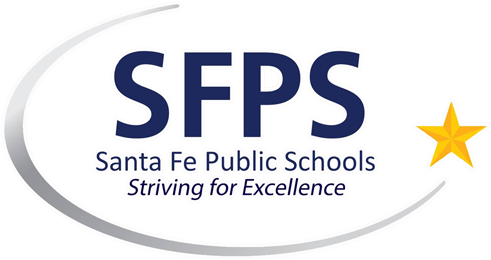To celebrate their collaborative creation of a rain garden at Ramirez Thomas Elementary, Santa Fe Public Schools (SFPS), the Santa Fe Watershed Association (SFWA), and the Kiwanis Club of Santa Fe held a ribbon-cutting ceremony on April 16th.
Ramirez Thomas Elementary had been identified as one of the schools most impacted by extreme heat, following the city’s Heat Island Study. The newly constructed rain garden helps mitigate this issue by increasing vegetation, which lowers surface temperatures and enhances the outdoor environment for students and staff.
Made possible by the generous support of the Kiwanis Club of Santa Fe in honor of the 100th Burning of Zozobra in 2024, this innovative project transformed an existing retention basin into a vibrant rain garden. The garden captured and utilized stormwater runoff, reducing flood risks and contributing to local environmental health.
Key features of the rain garden include capturing 90,000 gallons of stormwater annually with rock “Zuni Bowls” to reduce runoff and erosion, using native, drought-tolerant plants to support wildlife and thrive without irrigation, and providing educational and environmental benefits through bilingual signage, improved air quality, and added green space.
The rain garden initiative was led by Aaron Kauffman of Southwest Urban Hydrology, who worked closely with SFPS to design, install the rain garden and educate students about passive irrigation systems. These systems utilize rainwater instead of traditional irrigation, promoting long-term sustainability and environmental stewardship.
Since 2012, SFPS, SFWA, the City of Santa Fe, and Southwest Urban Hydrology have collaborated on multiple projects across city properties and school campuses at Santa Fe High, NYE Early Childhood Center, and Early College Opportunities (ECO) High School. These initiatives reflected a shared commitment to sustainable water management and climate resilience.
“The Santa Fe Watershed Association is thrilled to support these projects, which represent a powerful intersection of education, sustainability, and community well-being,” said Morika Vorenberg Hensley, SWA Executive Director. “By working together, we are building a greener, healthier future for Santa Fe’s students and residents.”

SFPS presenta un nuevo jardín de lluvia para combatir el calor y promover la sostenibilidad

Para celebrar la creación colaborativa de un jardín de lluvia en la Escuela Primaria Ramirez Thomas, las Escuelas Públicas de Santa Fe (SFPS), la Asociación de la Cuenca Hidrográfica de Santa Fe (SFWA) y el Club Kiwanis de Santa Fe celebraron una ceremonia de inauguración el 16 de abril.
La Escuela Primaria Ramirez Thomas fue identificada como una de las escuelas más afectadas por el calor extremo, según el Estudio de Isla de Calor de la ciudad. El jardín de lluvia recién construido ayuda a mitigar este problema al aumentar la vegetación, lo que reduce las temperaturas superficiales y mejora el ambiente exterior para estudiantes y personal.
Este innovador proyecto, posible gracias al generoso apoyo del Club Kiwanis de Santa Fe en conmemoración de la 100.ª Quema de Zozobra en 2024, transformó una cuenca de retención existente en un vibrante jardín de lluvia. El jardín capturó y aprovechó la escorrentía de aguas pluviales, reduciendo el riesgo de inundaciones y contribuyendo a la salud ambiental local.
Las características principales del jardín de lluvia incluyen la captación de 90,000 galones de aguas pluviales al año mediante "Zuni Bowls" de roca para reducir la escorrentía y la erosión, el uso de plantas nativas resistentes a la sequía para apoyar la vida silvestre y prosperar sin riego, y la provisión de beneficios educativos y ambientales mediante señalización bilingüe, mejor calidad del aire y la ampliación de espacios verdes.
La iniciativa del jardín de lluvia fue liderada por Aaron Kauffman, de Southwest Urban Hydrology, quien colaboró estrechamente con SFPS para diseñar, instalar y educar a los estudiantes sobre los sistemas de riego pasivo. Estos sistemas utilizan agua de lluvia en lugar del riego tradicional, promoviendo la sostenibilidad a largo plazo y el cuidado del medio ambiente.
Desde 2012, SFPS, SFWA, la Ciudad de Santa Fe y Southwest Urban Hydrology han colaborado en múltiples proyectos en propiedades municipales y campus escolares de la Preparatoria Santa Fe, el Centro de Educación Infantil NYE y la Preparatoria Early College Opportunities (ECO). Estas iniciativas reflejan un compromiso compartido con la gestión sostenible del agua y la resiliencia climática.
“La Asociación de la Cuenca Hidrográfica de Santa Fe se complace en apoyar estos proyectos, que representan una poderosa intersección entre la educación, la sostenibilidad y el bienestar comunitario”, declaró Morika Vorenberg Hensley, Directora Ejecutiva de SWA. “Al trabajar juntos, estamos construyendo un futuro más verde y saludable para los estudiantes y residentes de Santa Fe”
 .
.

